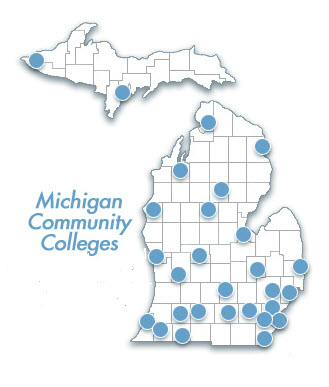Navigating Higher Education in Michigan: A Comprehensive Guide to Colleges and Universities
Related Articles: Navigating Higher Education in Michigan: A Comprehensive Guide to Colleges and Universities
Introduction
With enthusiasm, let’s navigate through the intriguing topic related to Navigating Higher Education in Michigan: A Comprehensive Guide to Colleges and Universities. Let’s weave interesting information and offer fresh perspectives to the readers.
Table of Content
Navigating Higher Education in Michigan: A Comprehensive Guide to Colleges and Universities

Michigan boasts a diverse landscape of higher education institutions, ranging from renowned research universities to specialized technical colleges. Choosing the right college is a crucial decision, and understanding the options available is essential for navigating this journey. This article provides a comprehensive overview of Michigan’s colleges and universities, focusing on key factors for prospective students and their families.
A Map of Educational Opportunities:
Michigan’s higher education landscape is geographically dispersed, offering a variety of options depending on location preferences. From the bustling urban centers of Detroit and Ann Arbor to the scenic landscapes of northern Michigan, colleges and universities are strategically located across the state.
-
Southeast Michigan: This region is home to some of the state’s largest and most prestigious institutions, including the University of Michigan (Ann Arbor), Michigan State University (East Lansing), Wayne State University (Detroit), and Oakland University (Rochester). These institutions offer a wide array of academic programs and research opportunities.
-
West Michigan: Grand Rapids, Kalamazoo, and Holland are prominent cities in this region, each hosting several colleges and universities. Grand Valley State University (Allendale), Western Michigan University (Kalamazoo), and Hope College (Holland) are notable institutions with strong reputations in specific academic fields.
-
Northern Michigan: This region offers a more rural setting with smaller institutions, emphasizing experiential learning and a close-knit community atmosphere. Northern Michigan University (Marquette), Michigan Technological University (Houghton), and Central Michigan University (Mount Pleasant) are key players in this region, catering to a diverse student population.
Understanding the Landscape:
Michigan’s higher education system comprises various types of institutions, each with its unique strengths and offerings:
-
Public Universities: These institutions are funded by the state and generally offer lower tuition rates compared to private institutions. They are often large and comprehensive, offering a wide range of academic programs and research opportunities.
-
Private Universities: These institutions are privately funded and may have higher tuition rates. They often focus on specific areas of study or have a distinct religious or philosophical affiliation.
-
Community Colleges: These institutions offer two-year associate degrees and certificate programs, providing a more affordable and accessible pathway to higher education. They often serve as transfer pathways to four-year universities.
-
Technical Colleges: These institutions specialize in vocational training and technical skills, preparing students for specific careers in industries like healthcare, technology, and manufacturing.
Factors to Consider When Choosing a College:
-
Academic Programs: Identify the specific programs of interest and evaluate the institution’s reputation and resources within those fields.
-
Location: Consider the proximity to home, desired urban or rural setting, and access to cultural and recreational activities.
-
Cost and Financial Aid: Evaluate tuition rates, fees, and available financial aid options to determine affordability.
-
Campus Culture: Explore campus life, student organizations, and extracurricular activities to gauge the institution’s social and cultural environment.
-
Faculty and Staff: Research faculty qualifications, teaching experience, and support services available to students.
FAQs About Colleges in Michigan:
Q: What are the top-ranked universities in Michigan?
A: The University of Michigan (Ann Arbor) and Michigan State University (East Lansing) consistently rank among the top national universities. Other highly regarded institutions include:
-
Public: University of Michigan (Ann Arbor), Michigan State University (East Lansing), Wayne State University (Detroit), University of Michigan (Dearborn), Western Michigan University (Kalamazoo), Grand Valley State University (Allendale), Central Michigan University (Mount Pleasant), and Oakland University (Rochester).
-
Private: University of Notre Dame (South Bend, Indiana, but with a significant Michigan presence), Kalamazoo College, Hope College, Albion College, and Hillsdale College.
Q: How do I find a college that is a good fit for me?
A: Begin by identifying your academic interests and career goals. Explore college websites, attend virtual or in-person college fairs, and connect with current students or alumni to gather information. Consider using online resources like College Board, US News & World Report, and Niche to compare colleges based on your preferences.
Q: What are the best colleges for specific majors?
A: Research institutions with strong reputations in your desired field. Many colleges have specialized programs and faculty expertise in specific areas, such as engineering, business, healthcare, or the arts.
Q: How can I afford college?
A: Explore financial aid options like scholarships, grants, loans, and work-study programs. Many colleges have dedicated financial aid offices to assist students in navigating the financial aid process.
Tips for Choosing a College in Michigan:
-
Visit Campuses: Arrange campus tours or virtual visits to experience the atmosphere and facilities firsthand.
-
Talk to Current Students: Connect with current students to gain firsthand insights into campus life, academic programs, and faculty.
-
Consider Career Services: Evaluate the career services offered by each institution, including internships, job placement assistance, and alumni networks.
-
Focus on Your Personal Goals: Choose a college that aligns with your academic aspirations, career goals, and personal values.
Conclusion:
Choosing a college is a significant step in your educational journey. By carefully considering your academic interests, career goals, and personal preferences, you can identify the institution that best aligns with your aspirations. Michigan’s diverse landscape of higher education institutions provides a wealth of opportunities for students of all backgrounds and interests. With thorough research and careful planning, you can find the perfect college to launch your future success.


:max_bytes(150000):strip_icc()/UMDCASL-1185d368bdaa44bf89206e4dfed0498a.jpg)

![Top 23 Best Colleges & Universities in Michigan [2020 List & Rankings]](https://www.edsmart.org/wp-content/uploads/2019/08/best-colleges-universities-in-Michigan_Monroe_County_Community_College-e1568329209994.png)



Closure
Thus, we hope this article has provided valuable insights into Navigating Higher Education in Michigan: A Comprehensive Guide to Colleges and Universities. We thank you for taking the time to read this article. See you in our next article!